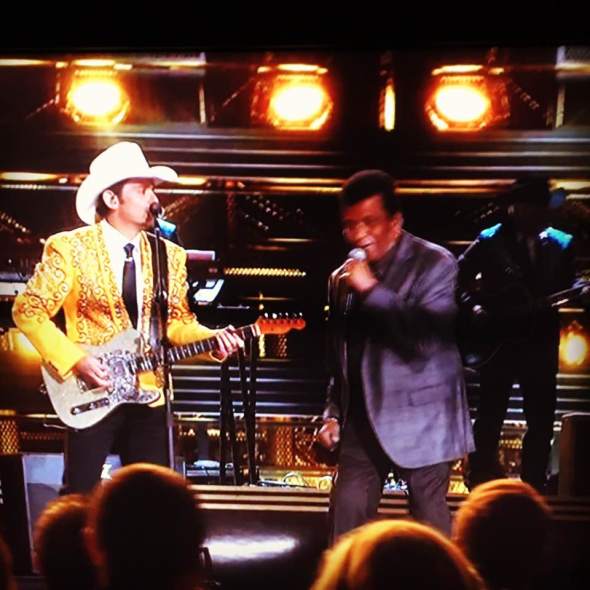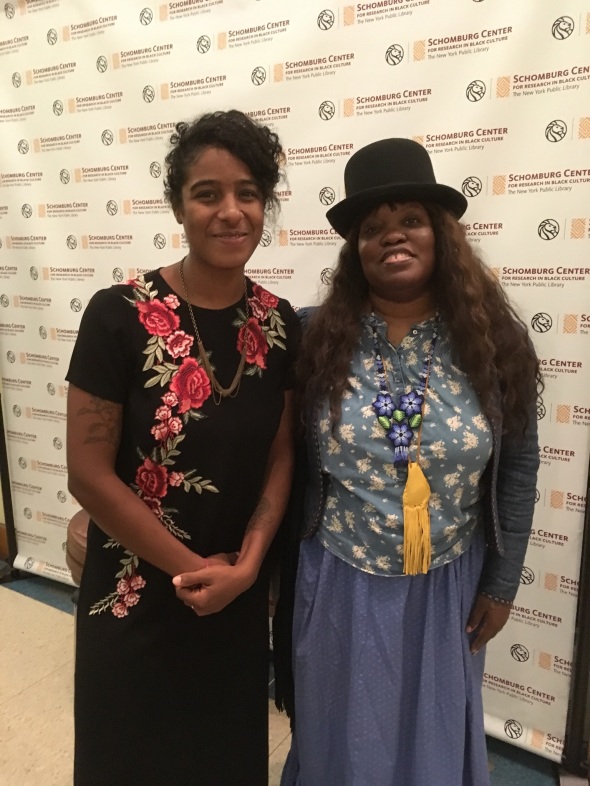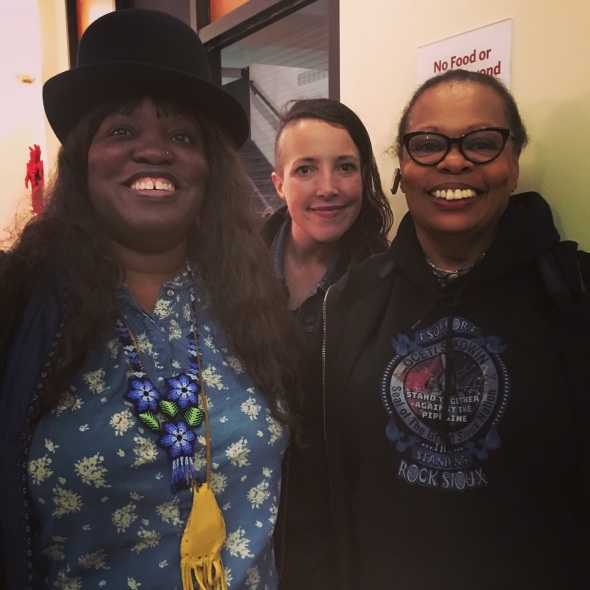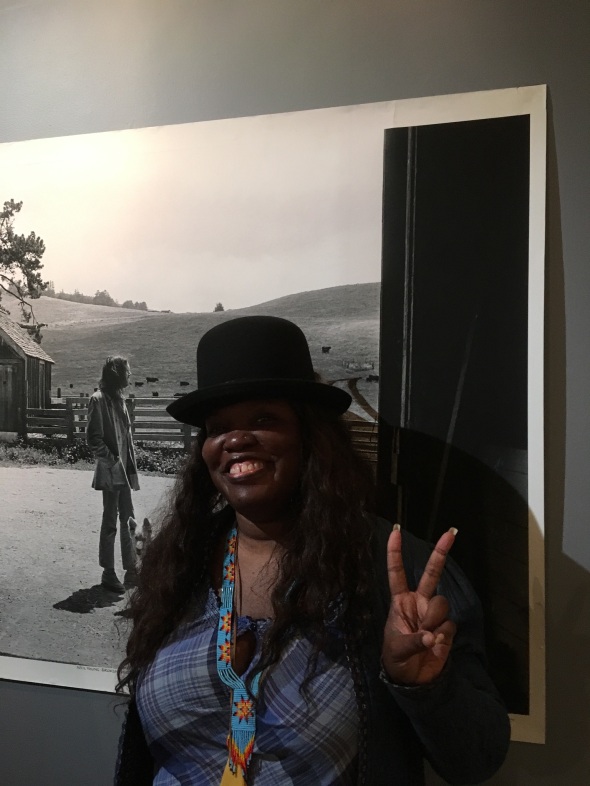Throwback Thursday: Of race, Country music & the 2016 CMAs
Well, since my sentiments about the state of Nashville’s country music establishment on and beyond Music Row tend to be unwelcome even amongst my former circle of rock critic colleagues, I wasn’t going to weigh in on this year’s CMA Awards, the 50th edition, which I did happen to watch. However, in my absence offline, an apparent controversy has been brewing on the subject of race and country music, due to the much ballyhooed performance of “Daddy Lessons” by Texan artists Beyonce (pop, urban) & the Dixie Chicks (once modern country royalty). Although I don’t wish to gas up TMZ, the site is one of the prominent places that has cited the CMA site & social media having scrubbed their entire online platform of images/references to said Beyonce-Dixie Chicks summit in response to copious racist reactions to the awards show appearance on Twitter & elsewhere: VIEW HERE
Now, I am no Beyonce fan nor “stan;” and I have no fear of the BeyHive in stating this — my backpages as a longtime music critic & editor for over 20 years clearly delineates where I stand on her & chronicles many of my thoughts on the history and contemporary scene of black artists who create in the overlapping country & western, bluegrass, hillbilly, Cajun, prewar stringband, mountain music, Americana, and roots genres. I also happen to have served on a panel @ CUNY Graduate Center in NYC earlier this year, holding forth on Black Banjo, my role in the country & western genre as an artist and touring fan, the Affrilachia movement, and the recent publication of scholar/banjoist Laurent Dubois’ book THE BANJO – America’s African Instrument. Talked about the fictional Darlings of The Andy Griffith Show a.k.a. The Dillards, and how Doug Dillard became my favorite banjo player and influence via Dillard & Clark. And I am a veteran of my friend Greg Mays’ annual Harlem Hoedown, where I always square dance as I learned as a babychile in rural Virginia to the sounds of my dear friends the Ebony Hillbillies. I was a “primordial” adopter, supporter, and then critic of the Americana scene in general, way back into the 1980s, and have watched successive waves of cowpunk, neo-southern rock, alt-country, y’allternative, insurgent country, progressive country, Ameripolitan, indie folk, etc etc come to consciousness and come to market; and always pondered about the African presence in all of these scenes and on the record business side up to this day where Americana is now on the Billboard chart — the year’s big news in music. The pop/urban mix with country as a featured event of the CMA Awards has obvious precedent; many of my former colleagues are still talking about Justin Timberlake (who’s in the process of going Country & recording a country album) performing with Chris Stapleton last year. Yet this year’s turn, especially at the 50 marker, is notable less due to Beyonce but rather down to the fact that at a time when Bro-Country is waning, Taylor Swift has defected for pop, and nigh every classic arena rocker has cut a country record/moved to Nashville to revive flagging careers, country (&western) still has a glaring race problem and its related business wing cannot develop or sustain virtually any artists of color not named Darius Rucker. Opening the show with a too-brief turn by black country icon Charley Pride underscored this issue; the fact that the CMAs chose to have Stapleton and Dwight Yoakam — great & skilled though they are — pay homage to Georgia R&B hero & country maverick Ray Charles, to illustrate the S-O-U-L of country music instead of even summoning their own recent hitmaker Mickey Guyton or Americana star Rhiannon Giddens who was present at the awards (backing up Eric Church) showed exactly where they stand. The citing of SOUL, as it always has been, is code for the blackness in twang; the modern country (&western) scene and business has never quite progressed beyond the early 20th century moment of Race Records and segregating sounds by racial and regional provenance. And all hell broke loose on social media yesterday and today, as country music fans of the dominant culture rushed to show their displeasure with the inclusion of a black (pop) artist on the CMAs, accusing her of trying to take away country music from whites who supposedly have eternal ownership of the genre — despite the patent & well-documented African and Native American origins of country besides the Scotch-Irish contribution. I myself am a Native Americana / cosmic country & western artist in no small part because I am of Native American, African, and Scottish descent, a rich hybrid made in America’s Southeast from which the Source of the music eternally springs. I am also just a fanatic of bluegrass, mountain music, and cowboy tunes — and I claim as much ownership of that Creation as anybody. Keen observers have known for a spell that one of the most vibrant bluegrass scenes in the world is in Japan, and that events and festivals like the Black Banjo Gathering in Boone, North Carolina, have been yielding a younger, new wave of twang talent of African descent.
 (My shot of superstar country artist #BradPaisley & #CharleyPride opening #CMAAwards50 – credit: @kandiacrazyhorse Instagram)
(My shot of superstar country artist #BradPaisley & #CharleyPride opening #CMAAwards50 – credit: @kandiacrazyhorse Instagram)
Here’s what I posted in response to the show on Wednesday night, while live-blogging portions of it on Facebook & Instagram: “I am watching #CMAAwards50 & pondering deeply about the African & Native American roots of the genre; plus how far Nashville & Music Row still have to go in honoring these legacies. Wonderful to see my hero #CharleyPride open the show with my fellow Virginian #BradPaisley (Yep, I’m a fan, despite the unwieldy “Accidental Racist;” I blame LL Cool J); but still tinged with some sadness and confusion. Someday, #NativeAmericana & #BlackHillbilly will take their proper place. For now, enjoying seeing all the 1960s & ’70s country women I grew up on that made me aspire to sing in twang, besides my Native American triumvirate (Buffy Sainte-Marie, Karen Dalton, Rita Coolidge): Loretta Lynn, Tanya Tucker, Barbara Mandrell (!!)…& Reba…Waiting for Dolly [Parton], of course…! #KandiaCrazyHorse #NativeAmericana #mountainmusic #AppalachiaSounds from #Virginia #countrysinger #southernbelle #countrygirlsdoitbetter #AffrilachianNation”
Quibbling about how pop or authentically country any given act is — that’s something I leave to the working music critics. Certainly, the Dixie Chicks’ reappearance on the CMAs was controversial due to their past & interesting to have that baggage reexamined so close to the presidential election. Some staunch country loyalists were always going to react negatively to that. Yet the main issue — just as a decade-plus battle for Country Music’s soul reaches its zenith (see the site Saving Country Music for consistent dispatches on this topic) — is that country (&western…& Americana) is the last frontier for artists of African descent — whether that be Virginia-bred me, Kandia Crazy Horse & my new band Cactus Rose, or Kenya’s leading country singer, Sir Elvis Otieno — and the country establishment and much of the genre’s audience still views it as their own private safe haven away from the predations of urban music/culture/style and technology-tied modernity. It is interesting that Bro-Country, which would often feature the likes of Florida-Georgia Line duetting with Nelly and Blake Shelton attempting to rap, is fading just as there is a rise and music industry push behind a range of country and Americana acts that claim rock and other musics as influences or stylistically and attitude-wise invoke 1970s Outlaw Country: Kacey Musgraves, Sturgill Simpson, Margo Price, Sam Outlaw, etc…and are hailed for restoring “true” country sonics and values […with nods to their precursors Shooter Jennings and Hank III (both of whom I often loved & covered as a critic in the past)]. Yet there’s still apparently little to no room under the twang tent for we country artists of color, cosmic or otherwise.
Hey, I love Tompall Glaser and Clarence White & Willie Nelson as much as any other ’70s babe of my generation; and as a singer-songwriter, I am clearly influenced by my most beloved Gene Clark and the Buffalo Springfield — hear my paeans “Quartz Hill” & “Americana” “Tula” (en espanol) & “Scene & Herd” etc — and the less-celebrated Ladies of the Canyon like Judee Sill, Claudia Lennear, and Essra Mohawk. Neil Young, I see you (& thanks for singing for Standing Rock). I spent the early 1970s toddling behind my dear lil’ Pamunkey mother from the Shenandoah Valley at the bluegrass tents of Folklife Festival, snuck viewings of my favorite show Hee-Haw (’twas grand to see Roy Clark pickin’ an’ grinnin’ on the CMA, yep?), dreaming of growing up to play the Grand Ole Opry (at the Mother Church Ryman, of course) just like Darius Rucker; he ain’t the only one! Sweetheart Of the Rodeo by The Byrds & The Notorious Byrd Brothers were always & still are major for me. I am talented, and I am well-versed in the breadth and depth of country; I am extremely proud of my southern roots. All we want, after so many moons of flying the freak-flag high for Black Hillbilly & Native Americana, is to have a permanent non-conditional seat at the (farm) table, per Mrs. Knowles-Carter’s great sister Solange.
As I go prepare to march for Standing Rock again this weekend through all of Manhattan, please note that the date for the Jalopy Theater water protectors benefit in Brooklyn has been changed to 25 November. Follow the new Cactus Rose band Instagram account at @cactusroselovesyou for more details as they are announced. I continue my personal commitment to ongoing activism on behalf of the Standing Rock water protectors, and the band & I are very much looking forward to playing with our friends from the Brooklyn Country scene! I expect this to be one of my treasured highlights of #NativeAmericanHeritageMonth 2016
A’ho*


 ( Kandia Crazy Horse & Kimberly Robison, Virginia Native American songbirds/activists of Cactus Rose + Gloria Gassaway, Catawba lead vocalist/bones player/activist of the Ebony Hillbillies (from South Carolina) – We southern belles love to gather, do actions for #StandingRock & sing to honor our Ancestors. Miz Gloria almost went out to Standing Rock last week with our heroine Pure Fe of Ulali; we hope to combine our efforts & make a sojourn together soon come – A’ho* )
( Kandia Crazy Horse & Kimberly Robison, Virginia Native American songbirds/activists of Cactus Rose + Gloria Gassaway, Catawba lead vocalist/bones player/activist of the Ebony Hillbillies (from South Carolina) – We southern belles love to gather, do actions for #StandingRock & sing to honor our Ancestors. Miz Gloria almost went out to Standing Rock last week with our heroine Pure Fe of Ulali; we hope to combine our efforts & make a sojourn together soon come – A’ho* ) (Throwback to last Thursday night in SoHo @ Morrison Hotel Gallery for private view of Neil Young: Long May You Run exhibit, featuring photographs by Henry Diltz, Joel Bernstein, Danny Clinch & others. Here I am “waging heavy peace” with Henry’s famed image of my hero Neil & his dog Harte in the barn door of his ranch in California, Broken Arrow (named after my favorite Buffalo Springfield native american-themed tune & a Delmer Daves western from the early 1950s), from the year I was born, NYC)
(Throwback to last Thursday night in SoHo @ Morrison Hotel Gallery for private view of Neil Young: Long May You Run exhibit, featuring photographs by Henry Diltz, Joel Bernstein, Danny Clinch & others. Here I am “waging heavy peace” with Henry’s famed image of my hero Neil & his dog Harte in the barn door of his ranch in California, Broken Arrow (named after my favorite Buffalo Springfield native american-themed tune & a Delmer Daves western from the early 1950s), from the year I was born, NYC)